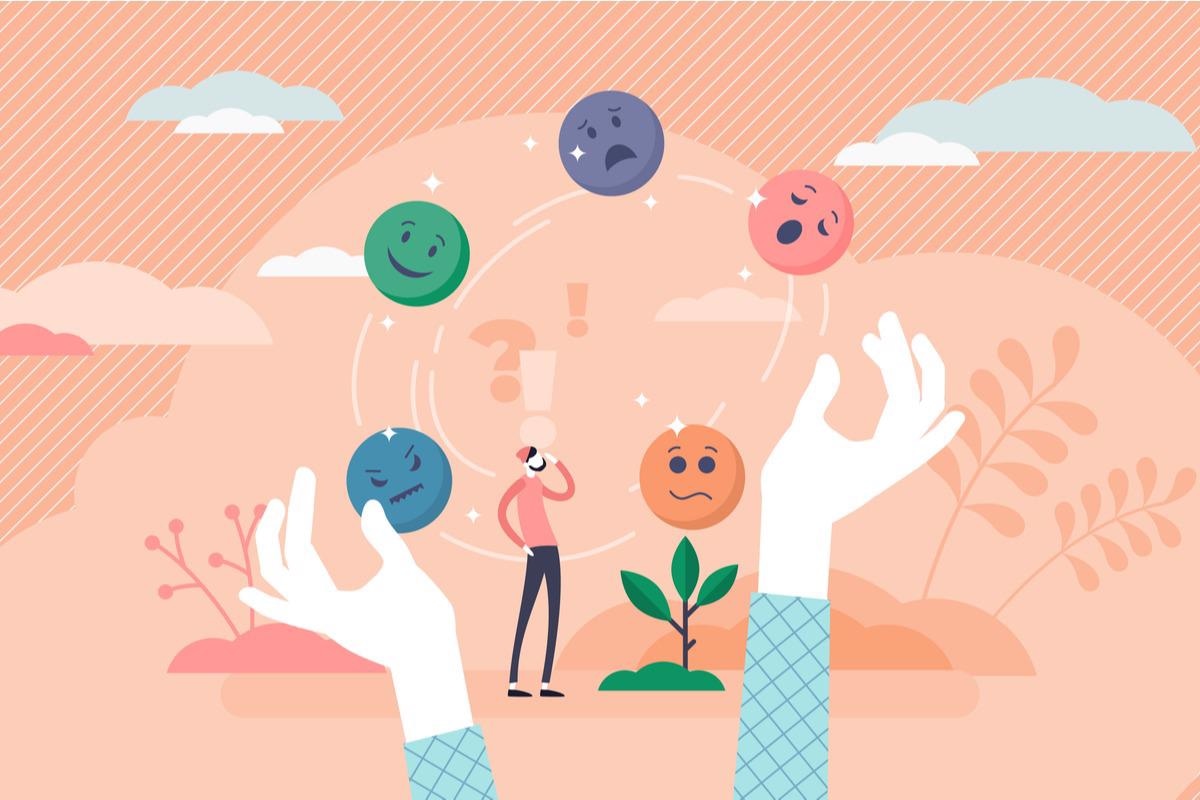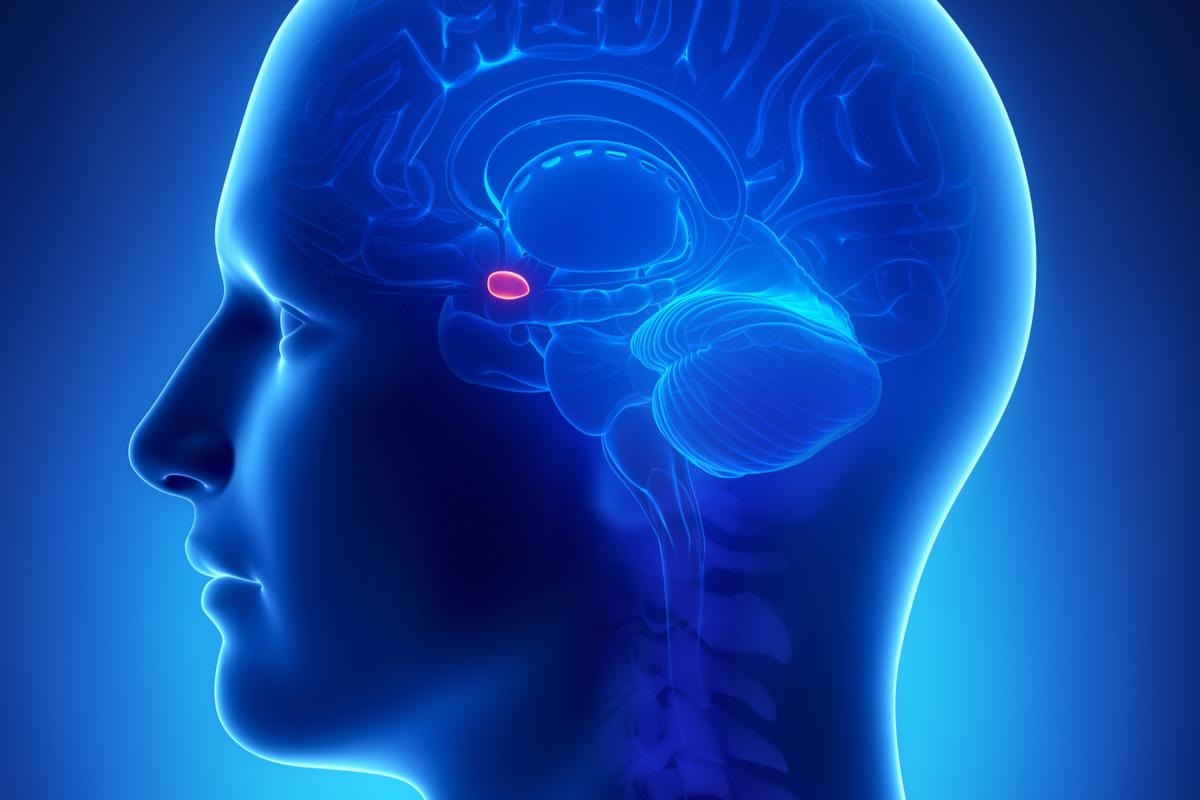Negative emotions and physical ill-health
Positive emotions and health
Emotions and eating
The Amygdala bridge
Understanding the link
Emotional regulation
References
People have long suspected or known that the health of the body is intimately connected to that of the mind. Sayings like "died of a broken heart" or "pined away from grief" are expressive of this relationship in its extreme form.
Modern research validates this ancient intuitive knowledge, showing that healthy emotions must be experienced and expressed in a correspondingly healthy manner to enhance mental and physical wellbeing. Unhealthy emotions, or healthy emotions that are not allowed any expression, may leach away the energy of living and increase the propensity to unhealthy coping mechanisms, chronic disease, or autoimmune manifestations.

Image Credit: VectorMine/Shutterstock.com
Emotions have long been classified as positive or negative, but a better way to think of them might be to evaluate how they affect one's general outlook on life under a given set of circumstances. For instance, in some situations, anger or fear is a positive response, while in others, they are uncalled for and therefore negative.
As psychologist Dr. Barbara L. Fredrickson of the University of North Carolina says, "All emotions—whether positive or negative—are adaptive in the right circumstances."
Negative emotions and physical ill-health
Problems with health may arise when negative emotions are due to undue dwelling in the past or constant anxiety rather than a response to the current scenario. Neuroticism, defined as the tendency to experience negative emotions and display aggressive, hostile, or angry behavioral patterns, is well-known to be a risk factor for a range of physical health outcomes like cardiovascular disease, asthma, and hypertension.
A depressive mood has been shown to be linked to major changes in cellular immunity in a dose-dependent manner. This includes lower lymphocyte response to antigens that would otherwise induce their proliferation, reduced natural killer (NK) cell activity, and fewer white cells in the blood.
Immune dysregulation as the result of psychological factors, such as unhealthy emotions, could be the underlying mechanism for aging, cardiovascular disease, osteoporosis, type 2 diabetes, arthritis, some cancers, and even frailty, via the production of inflammatory chemicals in the body in response to a negative affect. Again, both acute and chronic stress, hostility, and depression are suggested to be independent risk factors for cardiovascular disease.
Positive emotions and health
Conversely, a positive outlook on life has been associated with lower blood pressure, reduced cardiovascular risk, better weight control, healthy blood sugar levels, and increased longevity. Neuronal health and neural functioning, cardiovascular health, immune function, and endocrine physiology are all involved in stress responses.
The relationship between these has not yet been determined, especially as it could be bidirectional.
Emotions and eating
Some researchers propose that emotions induce eating by controlling the choice of foods or inhibiting food intake; emotions switch off higher brain control of eating; some individuals eat to reduce their emotional intensity. Comfort eating is often a mechanism to reduce negative emotions and control their intensity.
Eating too little or overeating are alike harmful to physical health. Yet the changes in eating could be the result of emotions hindering eating, a byproduct of certain emotions, or the result of emotional regulation.
The Amygdala bridge
Some scientists have used brain imaging to map the stimuli that trigger reward pathways in the basal ganglia and the ventral striatum, deep in the brain. Some results show that positive emotions activate the latter for a longer duration, during which time the individual experiences feelings of wellbeing. If this is the basal state of this part of the brain, healthful changes occur in the body.
With negative emotional states, amygdala activation occurs. Interestingly, this part of the brain is involved in processing emotions and regulating stress responses mediated by the important hypothalamo-pituitary-adrenal (HPA) axis. It is, therefore, key to the experience of feeling fear and anxiety.

Image Credit: CLIPAREA l Custom media/Shutterstock.com
With slow amygdala recovery from activation, individuals may be at higher risk for disease than faster recovery. Similarly, a larger volume of grey matter in the amygdala is linked to better emotional regulation and thus a more positive emotional response, as well as to better health outcomes.
Interestingly, these differences in amygdala grey matter volume and activation were also linked to the release of cortisol over the course of the day (the circadian rhythm), as well as in response to stressors, and with the stress responses of the individual, such as rising blood pressure and atherosclerotic changes.
Understanding the link
Several psychologists have tried to explain the relationship between emotions and health. For instance, a transactional analysis model would consider health to be in part the result of the individual's response to stressors. This response is influenced by the individual's choice and evaluation of both the stressors and coping responses, which depends on the individual's ability to regulate emotions.
Another model would suggest that the ability to regulate emotion affects the adoption of healthy or unhealthy behaviors that influence physical health. Yet another school of thought sees both the emotions and the physical health of an individual as the effects of genetic or other factors that influence both.
The transactional model of stress-illness fits with the findings of the brain imaging study quoted above, with the amygdala being a major component of the neural circuit that links the regulation of emotions with the physiological expression of different health parameters. Those who best regulate their emotions can evaluate stressful situations more positively and cope with them more proactively. This helps them avoid the changes in the amygdala that are induced by chronic stress, which would otherwise cause the nerve cells to deteriorate.
The healthy amygdala then dampens the stress-induced activity of the HPA axis, protecting the cardiovascular, nervous, endocrine, and immune systems from damage, and maintaining physical health.
Emotional regulation
The ability to control one's emotions and promote a positive mindset would thus be helpful, seen in this light, to adapt well to one's environment, enhancing physical wellbeing as well as emotional health.
When positive emotions are predominant, it's not just about bouncing with happiness. Instead, such individuals tend to cope better with adverse situations, regaining their ability to get on with life and do what is expected of them more easily. This is called resilience and is invaluable if one wants to live with meaning and purpose despite adverse situations.

Image Credit: LAONG/Shutterstock.com
In fact, emotional responses can be learned, like any other healthy habit. Methods to learn how to regulate your emotional balance include quiet times, cognitive therapy, and retreats, when people think about the things that are important to them and how they can prioritize them in their lives.
For example, when people think about the kind and compassionate acts and how to foster them in their own lives, the results in terms of their own behavior were positive – and were reflected in their brain reward circuits. Associated changes included positive feelings and greater social connections, as well as enhanced nervous regulation of the heart rate.
Again, self-affirmation, in the sense of thinking about the things one values most, can help produce a positive attitude towards healthy behavioral changes that could foster good health. Learning to feel gratitude enhances feelings of joy. And learning forgiveness skills reduce feelings of hurt and bitterness.
Either by helping individuals change their perception of events and experiences or by altering their behavioral response to such events, it is possible to teach emotional regulation. Using objective parameters, further studies will help show the efficacy of such measures in improving physical health.
The Connection Between Emotion and Physical Health
References
- Song, Y. et al. (2014). Regulating Emotion to Improve Physical Health Through the Amygdala. Social Cognitive and Affective Neuroscience. https://dx.doi.org/10.1093%2Fscan%2Fnsu083. https://www.ncbi.nlm.nih.gov/pmc/articles/PMC4381236/
- Herbert, T. S. et al. (1993). Depression and Immunity: A Meta-Analytic Review. Psychological Bulletin. doi: 10.1037/0033-2909.113.3.472. https://pubmed.ncbi.nlm.nih.gov/8316610/
- Kiecolt-Glaser, J. K. et al. (2002). Journal of Consulting and Clinical Psychology. doi: 10.1037//0022-006x.70.3.537. https://pubmed.ncbi.nlm.nih.gov/12090368/
- Krantz, D. S. et al. (2002). Effects of Psychological and Social Factors on Organic Disease: A Critical Assessment of Research on Coronary Heart Disease. Annual Review of Psychology. doi: 10.1146/annurev.psych.53.100901.135208. https://pubmed.ncbi.nlm.nih.gov/11752489/
- Suls, J. et al. (2005). Anger, Anxiety, And Depression as Risk Factors for Cardiovascular Disease: The Problems and Implications of Overlapping Affective Dispositions. Psychological Bulletin. DOI: 10.1037/0033-2909.131.2.260. https://pubmed.ncbi.nlm.nih.gov/15740422/
- Pressman, S. D. et al. (2005). Does Positive Affect Influence Health? Psychological Bulletin. https://doi.org/10.1037/0033-2909.131.6.925. https://pubmed.ncbi.nlm.nih.gov/16351329/
- Macht, M. (2008). How Emotions Affect Eating: A Five-Way Model. Appetite. https://doi.org/10.1016/j.appet.2007.07.002. https://pubmed.ncbi.nlm.nih.gov/17707947/
- Evers, C. et al. (2010). Feeding your Feelings: Emotion Regulation Strategies and Emotional Eating. Personal Social Psychology Bulletin. doi: 10.1177/0146167210371383. https://pubmed.ncbi.nlm.nih.gov/20460650/
- Schnepper, R. et al. (2020). Fight, Flight, – Or Grab a Bite! Trait Emotional and Restrained Eating Style Predicts Food Cue Responding Under Negative Emotions. Frontiers in Behavioral Neuroscience. https://doi.org/10.3389/fnbeh.2020.00091. https://www.frontiersin.org/articles/10.3389/fnbeh.2020.00091/full
- Positive Emotions and Your Health. (2015). https://newsinhealth.nih.gov/2015/08/positive-emotions-your-health
Last Updated: Jun 6, 2022